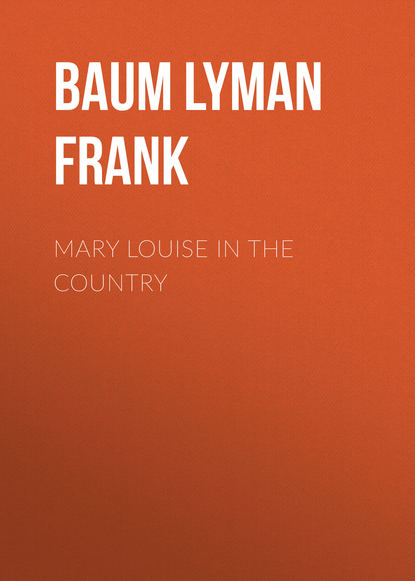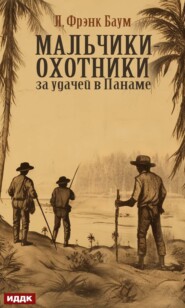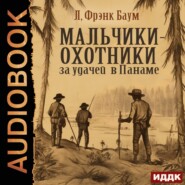По всем вопросам обращайтесь на: info@litportal.ru
(©) 2003-2024.
✖
Mary Louise in the Country
Настройки чтения
Размер шрифта
Высота строк
Поля
"His work here is a violation of neutrality; it is contrary to the treaty between our country and England. According to our laws Hezekiah Cragg and his followers, in seeking to deprive England of her Irish possession, are guilty of treason."
"Could he be prosecuted for sympathizing with his own race?"
"No; for sending them arms and ammunition to fight with, yes. And that is what they have been doing."
"Then you can arrest him for this act?"
"I can," said O'Gorman, "but I'll be hanged if I will, Josie. Cragg is an idealist; the cause to which he has devoted his life and fortune with a steadfast loyalty that is worthy of respect, is doomed to failure. The man's every thought is concentrated on his futile scheme and to oppose him at this juncture would drive him mad. He isn't doing any real harm to our country and even England won't suffer much through his conspiracy. But, allowing for the folly of his attempt to make his people free and independent, we must admire his lofty philanthropy, his self-sacrifice, his dogged perseverence in promoting the cause so near and dear to his heart. Let some other federal officer arrest him, if he dares; it's no work for an O'Gorman."
Josie had encountered many surprises during her brief career as an embryo detective, but this revelation was the crowning astonishment of her life. All her carefully prepared theories concerning Hezekiah Cragg had been shattered by her father's terse disclosure and instead of hating Old Swallowtail she suddenly found sympathy for his ideals welling in her heart. Josie O 'Gorman was Irish, too.
She pondered deeply the skilled detective's assertions and tried to fit them to her knowledge of old Cragg's character. The story seemed to account for much, but not all. After a time she said:
"But this mysterious business of his, which causes him to write so many letters and to receive so many answers to them – what connection can it have with the Champions of Irish Liberty?"
"Very little," said her father, "except that it enables Cragg to earn more money to feed into the ever-hungry maw of the Cause. Cragg's 'business' is one of the most unique things of the sort that I have ever encountered. And, while it is quite legitimate, he is obliged to keep it secret so as not to involve his many customers in adverse criticism."
"What on earth can it be?"
"It pertains to heaven, not earth, my dear," said O'Gorman dryly. "Cragg was educated for the ministry or the priesthood – I can't discover whether he was Catholic or Protestant – but it seems he wasn't fitted for the church. Perhaps he already had in mind the idea of devoting his life to the land that gave him birth. Anyhow, he was a well versed theologian, and exceptionally brilliant in theses, so when his money gave out he began writing sermons for others to preach, doing a mail-order business and selling his products to those preachers who are too busy or too lazy to write their own sermons. He has a sort of syndicate established and his books, which I have examined with admiration and wonder, prove he supplies sermons to preachers of all denominations throughout the United States. This involves a lot of correspondence. Every week he writes a new sermon, prints a large number of copies and sends one to each of his clients. Of course he furnishes but one man in a town or city with his products, but there are a good many towns and cities to supply."
"Is he printing sermons now?" asked Josie.
"Perhaps so; or it may be he is printing some circular to be distributed to the members of the C. I. L. Jim Bennett, the husband of the postmistress here, was once a practical printer, and he is a staunch member of the Irish fraternity. Cragg has known of this underground cavern for years, and at one time it was a regular meeting-place for his order of Champions. So he bought a printing press and, to avoid the prying eyes of his neighbors, established it here. That is the whole story of Cragg's 'crime,' Josie, and it is very simple when once fully explained."
"Do you mean to say you've discovered all this in the two days since you've been here?" asked the girl, in amazement.
"Every bit of it. I came prepared to arrest a gang of counterfeiters, and stumbled on this very interesting but quite harmless plot."
"Where have you been hiding since Sunday?" she inquired.
"Why, I didn't hide at all," he asserted. "Don't you remember giving me a ride yesterday in the Hathaway automobile?"
Josie sat silent. She was glad it was so dark under that shelf of rock, for she would rather her father did not read her humiliation and self-reproach.
"Daddy," she said, with a despairing accent, "I'm going to study to be a cook or a stenographer. I'll never make a decent detective – like Nan, for instance."
O'Gorman laughed.
"Poor Nan!" he exclaimed. "She's been more befuddled than you over this mysterious case. And Cragg is her own father, too. Come, Josie, it's getting late; let's go home."
CHAPTER XXVI
THE PLOT
When they were over the stones and in the lane again, walking arm in arm toward the village, Josie's logical mind turned from her own failure to a consideration of the story her father had just told her.
"I can't understand," she remarked, "how Joselyn came into this affair, what happened to him, or why he is once more the secret associate of old Cragg."
"Joselyn," said the old detective, "is a clever grafter – in other words, an unmitigated scoundrel. Now do you understand?"
"Not quite," confessed Josie.
"He's Irish."
"Isn't his name Scotch?"
"Yes, but Joselyn isn't his name. If you're inclined to pick up his record and follow it through, you'll probably find him pursuing his various adventures under many aliases. He doesn't belong in this country, you know, has only been here a few years, so his adventures would probably cover two continents. The fellow always manages to keep just within our laws, although sometimes he gets dangerously near the edge. The world is full of men like Joselyn. They don't interest me."
"Then he belongs to the band of Champions?" asked Josie.
"Yes. In going over Cragg's books and papers in his private office the other night, I found sufficient references to Ned Joselyn to figure out his story with a fair degree of accuracy," said O'Gorman. "He was born in Ireland, got into trouble over there with the authorities, and fled to America, where he met Annabel Kenton and married her. Getting in touch with Old Swallowtail, he joined the Champions and attended to the outside business for Mr. Cragg, purchasing supplies and forwarding them, with money, to the patriots in Ireland. I suppose he made a fair rake-off in all these dealings, but that did not satisfy him. He induced Cragg to invest in some wild-cat schemes, promising him tremendous earnings which could be applied to the Cause. Whether he really invested the money turned over to him, or kept it for himself, is a subject for doubt, but it seems that the old man soon suspected him of double-dealing and they had so many quarrels that Cragg finally threatened to turn him over to the authorities for extradition. That was when our precious Ned thought it wise to disappear, but afterward another peace was patched up, owing largely to the fact that Joselyn knew so much of the workings of the secret order that it was safer to have him for a friend than an enemy."
"I'm thinking of his poor wife," said Josie. "Does she know now where her husband is?"
"I think not. At first, in order to win the confidence of old Cragg, Ned applied considerable of his wife's money to the Cause, and while she would probably forgive his defalcations he thinks it wiser to keep aloof from her. She foolishly trusted him to 'settle' her mother's estate, and I'm sure he managed to settle most of it on himself. His value to Cragg lay in his ability to visit the different branches of the Champions, which are pretty well scattered throughout the United States, and keep them in touch one with the other. Also he purchased arms and ammunition to be forwarded secretly to Ireland. So you see it was quite impossible for the old man to break with him wholly, rascal though he knows him to be."
"I see," said Josie. "Joselyn has him in his power."
"Entirely so. A hint from him to the authorities would result in an embargo on any further shipments to the rebels in Ireland and so completely ruin the usefulness of the order of Champions. The fellow seems to be a thorn deeply embedded in the side of Old Swallowtail, who will suffer anything to promote the cause of Irish liberty."
"Ingua thinks her grandfather tried to kill Ned, at one time," remarked the girl.
"It's a wonder, with his rabid temper, that he didn't do so," said O'Gorman. "But perhaps he realized that if he was hanged for Joselyn's murder his beloved Order would be without a head and in sorry straits. Thousands of Irishmen are feeding the funds of the Champions, aside from what Cragg himself dumps into the pot. So the old fellow is in a responsible position and mustn't commit murder, however much he may long to, because it would jeopardize the fortunes of his associates. However, the end is not yet, and unless Joselyn acts square in his future dealings he may yet meet with a tragic fate."
"I wonder what was in that package he took away with him the other night?" mused Josie. "I was sure, at the time, it was counterfeit money."
"It probably contained the monthly printed circular to the various branches of the order. Jim Bennett prints them in that underground cavern and Ned Joselyn sees they are distributed."
"Well," said Josie with a sigh, "you've pricked my bubble, Daddy, and made me ashamed. With all my professed scorn of theories, and my endeavors to avoid them, I walked straight into the theoretic mire and stuck there."
O'Gorman pressed her arm affectionately.
"Never you mind, my dear," in a consoling tone; "you have learned a lesson that will be of great value to you in your future work. I dare not blame you, indeed, for I myself, on the evidence you sent me, came rushing here on a wild-goose chase. One never knows what is on the other side of a page till he turns it, and if we detectives didn't have to turn so many pages, only to find them blank, we'd soon rid the country of its malefactors. But here we are at the Kenton gateway. Go to bed, Josie dear, and pleasant dreams to you."
"Will I see you again?" she asked.
"No; I'm off by the early train. But you must stay here and have your visit out with Mary Louise. It won't hurt you to have a free mind for awhile."
He kissed her tenderly and she went in.
CHAPTER XXVII
NAN'S TRIUMPH
The night's events were not yet ended. An automobile left the edge of the stone-yard, followed a lane and turned into the main highway, where it encountered a woman standing in the middle of the road and waving her arms. She was distinctly visible in the moonlight.
The man with the monocle slowed the car and came to a sudden stop, rather than run her down.

















